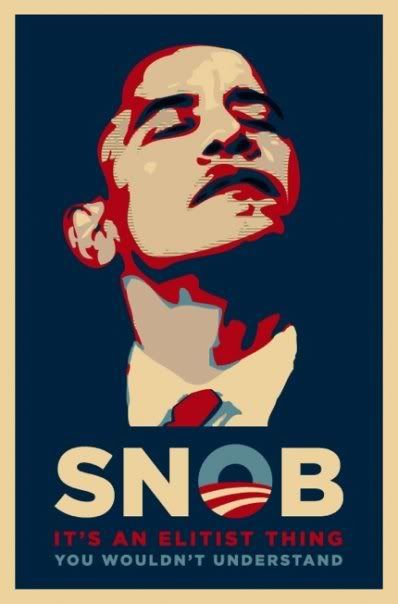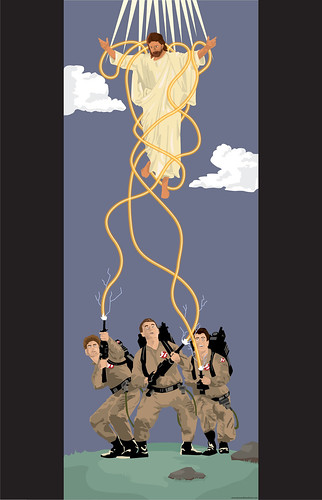2009-03-27
2009-03-25
Who ya gonna call (upon)?
For you non pop-culture mavens, the guys at the bottom are the Ghostbusters.
*(Biblical names, no doubt - but reflective of a paucity of uses of Scripturally shaped - and even mandated, in the Baptismal Formula from Christ & the Apostles - language used in the Bible.)
2009-03-24
Commemoration of Jonathan Edwards
 Jonathan Edwards was the last and greatest of the great New England Puritan preachers. Some historians account him the greatest intellect of the Western Hemisphere before 1900. (The achievements of his descendants are such that the Edwards family used to be cited in psychology textbooks -- and in Ripley's Believe It Or Not column -- as proof that genius is an inherited trait...frankly, it's gone down hill a bit in recent years.) The distinguished Austrian philosopher Herbert Feigl (not a Christian, by the way) lectured on the will and the intellect by practically quoting Jonathan Edwards. He remarked, "Edwards is the clearest writer available on the subject. If you want to think clearly about the human will, you begin by reading Edwards."
Jonathan Edwards was the last and greatest of the great New England Puritan preachers. Some historians account him the greatest intellect of the Western Hemisphere before 1900. (The achievements of his descendants are such that the Edwards family used to be cited in psychology textbooks -- and in Ripley's Believe It Or Not column -- as proof that genius is an inherited trait...frankly, it's gone down hill a bit in recent years.) The distinguished Austrian philosopher Herbert Feigl (not a Christian, by the way) lectured on the will and the intellect by practically quoting Jonathan Edwards. He remarked, "Edwards is the clearest writer available on the subject. If you want to think clearly about the human will, you begin by reading Edwards."
Edwards was born in Connecticut in 1703 and educated at home and at Yale University. As a youth, he had a keen interest in natural science, and wrote treatises On Insects and On The Rainbow (the latter in terms of the discoveries of Newton). When he was fourteen, he discovered the just-published writings of John Locke, doing so, as he said, "with greater pleasure than the greediest miser uncovering a rich hoard of gold and silver coins." He adopted Locke's psychology and epistemology as his own, and used them as the basis for an intellectual defense of Calvinism.
As a young man, Edwards was reading and contemplating on the words of Paul to Timothy (I Tim 6:14-16)
That thou keep this commandment without spot, unrebukable, until the appearing of our Lord Jesus Christ: Which in his times he shall shew, who is the blessed and only Potentate, the King of kings, and Lord of lords; Who only hath immortality, dwelling in the light which no man can approach unto; whom no man hath seen, nor can see: to whom be honour and power everlasting. Amen.
As he read, he felt an overwhelming sense of the majesty and grandeur of God, and what a privilege it is to serve so great a being, and what an honor God has bestowed upon us by calling us to his service. The experience of that day changed his life permanently. However, he hesitated to call it a conversion experience, since he was told by his spiritual directors that the fear of hell was an essential part of any conversion, and he could not find in his experience any trace of fear, but only wonder, awe, peace, joy, and gratitude. (Eventually, I suppose, he managed to frighten himself enough to put his mind at ease on the point.)  I note this with interest, since Edwards much later delivered a sermon called "Sinners in the hands of an angry God" that has attracted some interest among non-Christians. Anthologies of American Literature intended for survey courses in high school or college often include a short extract from Edwards, and that extract is practically always from this one sermon. Generations of students have learned nothing about Edwards except that he was a Puritan preacher who preached about Hell -- presumably every Sunday. In fact, mentions of Hell are rare in Edwards' writing. He has far more to say about the love of God than about his wrath.
I note this with interest, since Edwards much later delivered a sermon called "Sinners in the hands of an angry God" that has attracted some interest among non-Christians. Anthologies of American Literature intended for survey courses in high school or college often include a short extract from Edwards, and that extract is practically always from this one sermon. Generations of students have learned nothing about Edwards except that he was a Puritan preacher who preached about Hell -- presumably every Sunday. In fact, mentions of Hell are rare in Edwards' writing. He has far more to say about the love of God than about his wrath.
Why do school textbooks always print extracts from Edwards on hell-fire and never Edwards on the love of God in salvation through Christ or the transcendent splendor of the Thrice Holy Trinity? My own suspicion is that they know that most non-Christian teenagers will simply laugh off a hell-fire sermon, but that a significant number of them might be moved by Edwards' more usual approach as in this sermon. If students from non-Christian families started coming home and saying, "We read a sermon in English class today that really got to me, and I want to become a Christian," their parents would be talking to the school board and perhaps to a judge in nothing flat.
Religious experience is central to the life and thought of Jonathan Edwards. One of his major works is a treatise defending Predestination on logical and intellectual grounds. (This was the book that Feigl considered the definitive analysis of the concept of Free Will.) But it was not through logic that he was himself convinced of the doctrine. As a youth, he had vigorously rejected it as a horrible and immoral teaching, one inconsistent with the love of God. But when he had what he regarded as a direct experience and revelation of the grandeur and absolute sovereignty of God, all his former objections seemed irrelevant.
 After college, Edwards became assistant pastor and then pastor of Northampton Church, the most important church in Massachusetts outside Boston. There he preached a series of sermons on justification by faith that gave rise to an area-wide religious revival. A few years later, George Whitefield, an English Methodist evangelist, colleague of John Wesley, visited the area and his preaching occasioned a more widespread revival. Edwards wrote A Faithful Narrative of the Surprising Work of God and A Treatise on the Religious Affections, works in which he analyzed and defended various kinds of conversion experience.
After college, Edwards became assistant pastor and then pastor of Northampton Church, the most important church in Massachusetts outside Boston. There he preached a series of sermons on justification by faith that gave rise to an area-wide religious revival. A few years later, George Whitefield, an English Methodist evangelist, colleague of John Wesley, visited the area and his preaching occasioned a more widespread revival. Edwards wrote A Faithful Narrative of the Surprising Work of God and A Treatise on the Religious Affections, works in which he analyzed and defended various kinds of conversion experience.
Eventually Edwards had problems with his congregation. He thought that only persons who had undergone conversion ought to be admitted to the Lord's Supper, and his congregation thought otherwise. He accordingly resigned in 1750 and went to western Massachusetts to be a missionary to the Indians. He remained there for seven years, writing two of his major works, and struggling with language difficulties, ill health, and inter-tribal Indian wars. In 1757 he became president of Princeton University (then called the College of New Jersey) and a year later died from complications arising from a smallpox innoculation.
He was a pastor and teacher, preacher and missionary, scholar and philosopher, logician and visionary, and throughout it all, a faithful servant of Christ.
With Jonathan Edwards we commemorate David Brainerd, who was betrothed to Edwards' daughter. Brainerd was born in 1718, orphaned by the age of fourteen, and converted during his first year at Yale. His enthusiasm caused him to speak disparagingly of his unconverted tutor, and he was expelled. (Can I get an amen?) He became a missionary to the Indians, fell ill but determined to stick to his post, and finally came back home to Edwards' house to die at the age of 29. He had kept a journal which Edwards published two years after Brainerd's death, a journal which records his experiences as a missionary, and his spiritual reflections on his calling. Edwards thought that it might be an inspiration and help to other missionaries, and he was right. The book went into thirty editions. Many readers were encouraged by it to dedicate their lives to the preaching of the Gospel. Among them were William Carey, Thomas Coke, Robert Morrison, Samuel Marsden, Henry Martyn, Samuel Mills, and Thomas Chalmers. The journal is included in Edwards' Complete Works.
Leader of our great Hypocrisy
Our first black president (sorry, Bill) is also the first sitting president to appear on a late night tv show. There he was - the most powerful human being in the world - in the same seat occupied by such luminaries as Britney Spears, Carrot Top, and so many more, when he made a really good joke:
Leno: Now, are they going to put a basketball — I imagine the bowling alley has been just burned and closed down.
President Obama: No, no. I have been practicing all — (laughter.)
Leno: Really? Really?
President Obama: I bowled a 129. (Laughter and applause.)
Leno: No, that’s very good. Yes. That’s very good, Mr. President.
President Obama: It’s like — it was like Special Olympics, or something. (Laughter.)

It was a really funny joke, and anybody who complains about it is just a dour stick in the mud who hates the idea of a black president.
Which is of course why he immediately apologized:
Obama called Special Olympics Chairman Timothy Shriver after the show to apologize and to express his admiration for the organization. Shriver accepted the apology and later said he hoped the gaffe would serve as an opportunity to knock down myths about people with disabilities.
The most popular president in recent history (at least the past 6 years) goes in front of a national audience and makes a forgettable joke that really shouldn’t have offended anybody, but he shows just how noble and sensitive he is by promptly apologizing.
Like the media, we should all accept his heartfelt apology without question.

And apparently without holding him to his own standards.
Does anybody remember the Don Imus controversy? Here's what Junior Senator Obama had to say about that:
“I understand MSNBC has suspended Mr. Imus,” Obama told ABC News, “but I would also say that there’s nobody on my staff who would still be working for me if they made a comment like that about anybody of any ethnic group. And I would hope that NBC ends up having that same attitude…”
“He didn’t just cross the line,” Obama said. “He fed into some of the worst stereotypes that my two young daughters are having to deal with today in America. The notions that as young African-American women — who I hope will be athletes — that that somehow makes them less beautiful or less important. It was a degrading comment. It’s one that I’m not interested in supporting.”
Though every major presidential candidate has decried the racist remarks, Obama is the first one to say Imus should lose his job for them.
 What's that, Mr. President? I can't hear you over your derisive sneer and voting record.
What's that, Mr. President? I can't hear you over your derisive sneer and voting record.


